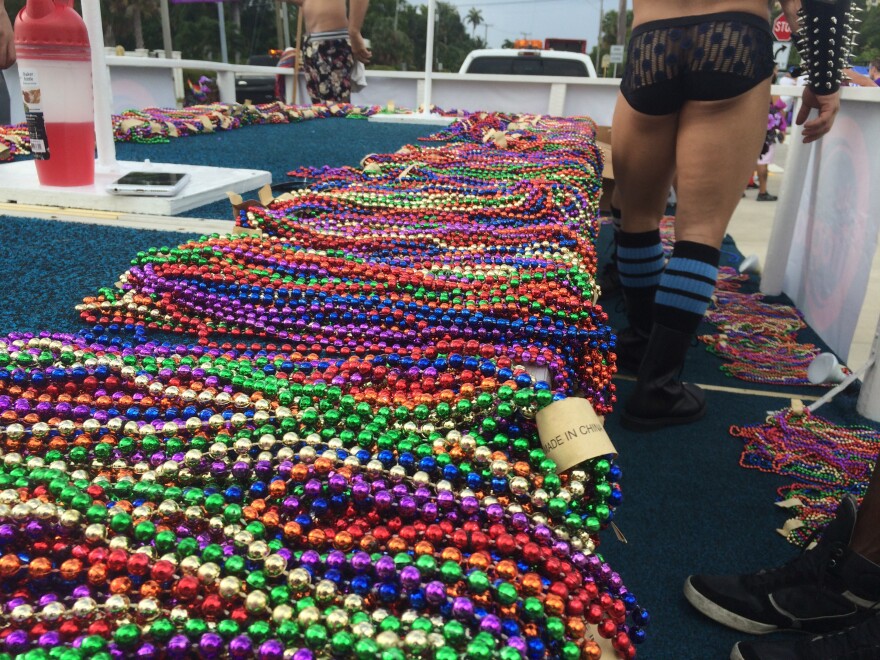At the Stonewall festival in Wilton Manors Saturday, Anthony Memminger was out in white face paint and a long green dress, spinning a rainbow umbrella while a marching band warmed up nearby.
Memminger is part of an order of queer nuns that was getting ready to dole out hugs and lollipops during the pride parade. “Sister Luna Glitter Tits, one of the Sisters of Perpetual Indulgence,” Memminger said.
Growing up in small-town Long Island, he didn’t always feel so confident in his sexuality. “I came from a family that -- my grandparents are from the south. So especially my grandfather, he didn’t want anybody who was gay to be a part of our family,” Memminger said.
The Stonewall Festival was named for a clash that began when police raided a popular New York gay bar nearly 50 years ago. This year, the annual pride parade took place under heavy police protection, just a week after a gunman’s rampage left 49 dead on the floor of a gay club in Orlando.
Memminger had seen his grandfather call other gay relatives slurs and kick them out of the house. At age 15, when he started to make gay friends and look for a place to unwind he got a fake ID and headed to a nightclub called Heaven.

Keeping the secret would not be easy. “My grandfather actually worked across the street at the New York Foundling Hospital,” Memminger said. “So before I came out to him I would sneak into the gay club, my friends would hide me and my grandfather would be standing outside as head of security, not knowing that his grandson was going to a gay club.”
My grandfather would be standing outside as head of security, not knowing that his grandson was going to a gay club. —Anthony Memminger
In those days, Memminger says the nightclub was a kind of home for him. When he worked up the courage to tell his family, he was too nervous to do it in person. He ran away instead.
“I wrote a letter and ran to my friend’s mom’s house— I love her to pieces,” Memminger recalled. “And the funny thing is, is after doing that, about a month later, I get a knock on the door, and there’s my grandfather, who was such a big homophobe, crying,”
Learning that his oldest grandson was gay turned out to be transformative “I guess for him, it was more of the realization that my grandson is still awesome, he’ll still kick somebody’s as, and still be fabulous,” Memminger said. “But sometimes not everybody has a lucky coming out story like that.”

As Sister Luna, Memminger sees his role as both sword and shield— “Making sure that everybody knows that if you don’t have a safe place, you could come to us”—all the more so after Orlando.
“My best friend was one of the people who got killed in Orlando,” Memminger said, referring to 24 year old Christopher Sanfeliz. “So, for me, it made me even more strength as a Sister, being a sword and shield."
"I know if he was here he would have wanted to be doing the same thing. And he had some good heels to do it in!” Memminger said with a laugh.
Most people don’t have to face the ordeal of coming out: there’s no added social hurdle that comes with discovering your sexuality, except, perhaps, finding the confidence to explore it. For many in the LGBTQ community, though, the experience of learning to be gay is learning to keep a secret.

The resolution often comes in a club like the one that was so violently targeted last week. “The first time I went out it really open my eyes up to what the possibilities were,” recalled Greyson Jubilee, who now makes his living as a DJ, primarily in gay clubs. “It gave me a sense of peace.”
At 17, Jubilee recalled, a friend from high school had convinced him to go to Coliseum, in Fort Lauderdale. “After I went out, it was like how can you be in again? You can’t go back in. Once you go out, you’re OUT!”
Stories like that seemed to be everywhere Saturday as crowds gathered along Wilton Drive to show their support.

Karen Hoglund said she never dreamed of coming out back home in the Caribbean nation of St. Vincent and the Grenadines; it can be a cruel place to be found out. “People beat you up, they beat you up really badly, and it’s the whole community that does that.”
Even after she came to the U.S., Hoglund said, it took her years to grow into her sexuality. When she did, it was drag shows that helped her embrace it. “To this day,” she said, going to drag shows has become a kind of weekly ritual. “I love my queens,” she said. “I go to Alibi every Sunday night.”


Hoglund said she came to the pride parade not just to show solidarity for Orlando, but for everyone who hasn’t yet found the sanctuary of a gay club. “I’m here representing everybody. The heart knows what it wants, and we can’t change that.”
As the parade went by, at least one young man got that message loud and clear. Christian Chaparo said he’d only decided to come to the Stonewall festival after his boss told him about the Stonewall riots, in 1969.
“I come from a very conservative family,” said Chaparo, who grew up in Puerto Rico. “I didn’t know what being gay was.” This weekend, Chaparo said he was still getting comfortable with being gay in the first place. But as soon as he got to Stonewall, he said, “I feel like I got a weight lifted off my shoulders.”











